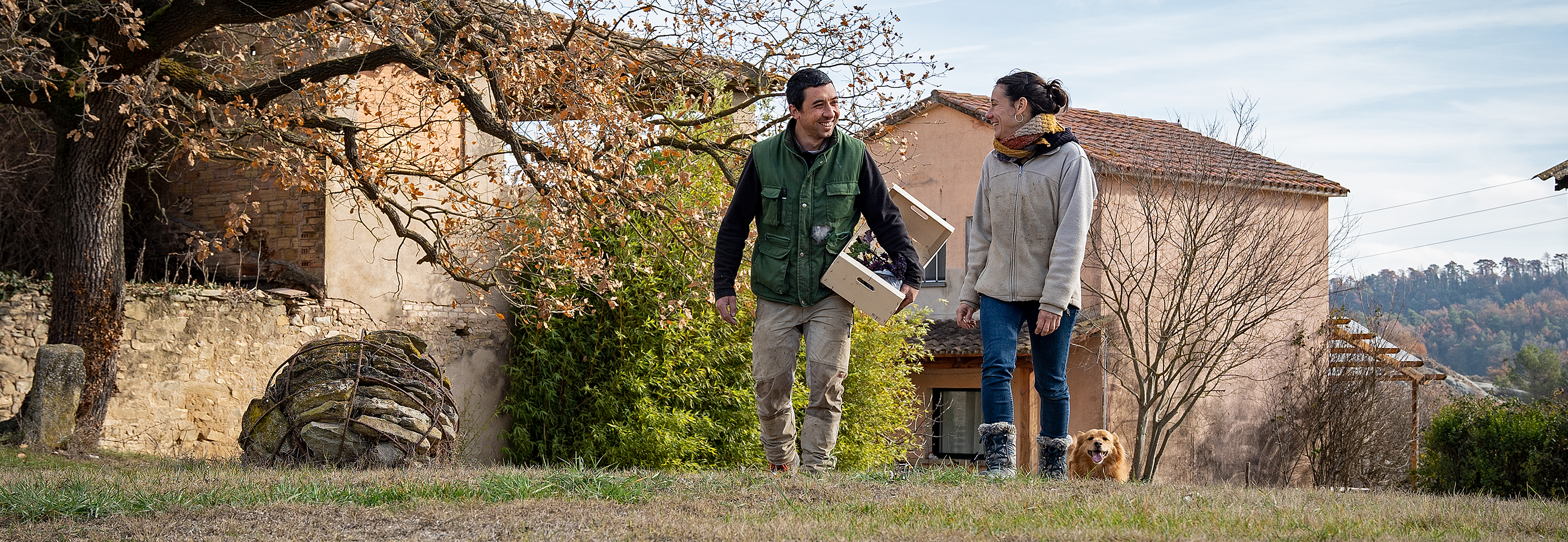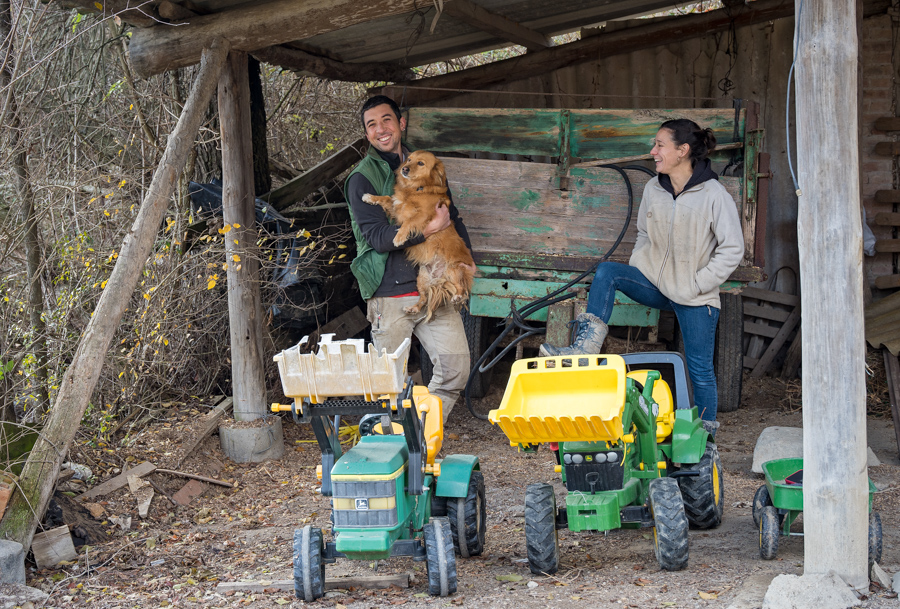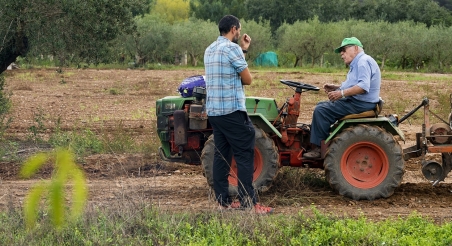Eva Carmona (Barcelona, 1987) and Armand Suriñach (Gurb, 1990) are a young farming couple with a shared desire to develop a life and professional project based on ecological agriculture. They run El Circell at Mas La Baga, a farmhouse located in Vespella, a hamlet in the municipality of Gurb. We paid them a visit to find out more about their approach to farming.
The farm belongs to Armand’s family, and although neither his parents nor his grandparents worked in farming, his two children are happy to grow up in this lovely setting, close to nature. It’s an absolute joy to explore the two hectares of orchards and vegetable gardens they cultivate here. During our visit, as we gently strolled among impressive rows of cabbages, celery and leeks, the only tractors we came across were toy ones belonging to the youngest members of the household, aged four and six. Eva and Armand proudly explained that their produce is certified by the Catalan Council for Organic Agricultural Production (CCPAE), and that El Circell has recently become a Private Partnership, which is a typical business structure for family companies in the agricultural sector. In terms of sales, they distribute a hundred baskets a week: some go to the store of the local association of producers and consumers, Mengem Osona, while the rest go to the customers scattered throughout the county.
However, combining parenting and work has not always been plain sailing. Despite taking on a worker, they’ve often had to restructure in order to keep moving forward. Indeed, talking to Eva helps us understand the dilemmas of a feminist woman who’s striving to overcome the current challenges faced by an ancient profession. With Armand’s support, she endeavours to find solutions to the problems that inevitably arise when care and work are no longer shared within a community.
Their common project, El Circell (The Tendril) is named after the spiralling, threadlike appendages of climbing plants that twine around neighbouring structures for support as they grow. It’s an extremely apt concept that perfectly reflects Eva and Armand’s approach to agriculture and the environment. It involves plenty of sweat and effort, but it also gives them an enormous sense of satisfaction, knowing that they’re contributing to improving the world. We’re pleased to present a young farming couple we recommend following closely.
Your story together began when you were pretty young. When did your life paths coincide?
Eva Carmona (E): While Armand had lived in Gurb all his life, I was born in Barcelona and grew up in Castellbisbal. I was doing a degree in environmental science. One fine day, walking the Way of Saint James, I met Armand: I was 23 and he was 21. During our journey together, we realised we shared the same vision of the world. Our passion for caring for the earth brought us together.
So you had quite different childhoods. But when it came to studying, the two of you chose options that complement each other rather well.
Armand (A): I’m a technical agricultural engineer. In fact, my end-of-degree project was devoted to designing this farm.
E: And as I told you before, I’ve got a degree in environmental science. This land had been leased out to another farmer. When that contract came to an end, we decided to take it over. That was in 2014 and, although the farm belongs to the family, we had to start from scratch, because neither Armand’s grandparents nor his parents had ever worked in farming. We’re the first generation to enter the profession, so we needed to obtain tools and material, and to divide up the land, which might seem like nothing but actually involved a lot of work. What’s more, we had to make the switch to fruit and vegetable farming on land that had been used to grow the typical crops of the county: wheat, barley and rapeseed. It took us a year to get everything ready and then in 2015 we started selling our baskets.
Although you started from scratch, you already had the land. You’re among the 9.5% of people under 41 years old who enter the farming profession, according to data of the Catalan Ministry for Climate Action, Food and Rural Agenda.
A: Yes, at least we had the land, but we had to make a big initial investment, and fortunately the family helped us out. The fact that it’s family land means that our project will be able to stay here. If you’re on land that isn’t yours and they evict you, it must be incredibly tough. We know people who’ve already had to move to new land two or three times and it’s a real downer.
To foster access to land, Barcelona Provincial Council has implemented a Land Bank resource and other private initiatives exist that are negotiating leasing agreements. Nevertheless, do you think it’s complicated to find farming land nowadays?
E: Finding land is one of the hardest issues to deal with! Without it, you can't even get started... What’s more, you have to make the right choice, since working on it is a long-term job: you’re taking care of a farm in order to reap its fruits in the future, bearing in mind that the investments you make take many years to pay off.
«An effective way to commit to local production would be for all public canteens, hospitals, schools and entities managed by public authorities to serve local food» Eva Carmona
The cycle of nature runs at its own steady pace, while the economy forces us to work at a faster one. However, in the current context, what measures would you propose to improve agricultural renewal?
E: I think the public authorities should implement real policies to support farmers, and not only in terms of subsidies. We’d like local produce to be protected and promoted, and you can’t achieve that with a few TV ads. An effective way to commit to local production would be for all public canteens, hospitals, schools and entities managed by public authorities to serve local food. And incentives should be put in place to ensure that local food is cheaper than imported products! Those are proper measures. If the viability of the primary sector were ensured, there’d be more people who’d want to work in it. Right now, you only enter the farming profession if you’re passionate about it and value the many aspects that aren’t about the economy.
A: We’re farmers because it’s a way of life and thinking. We believe we’re doing good for everyone. Of course, we benefit from it economically because we have to make a living, but our goal isn’t to get rich.
What aspects of your daily work are you most enthusiastic about?
E: It’s gratifying to feel that you’re contributing to creating a better world through your work. We really like living here and being in touch with the land. Producing healthy food and looking after the planet and its people gives us a lot and makes us feel good. It’s true that some people are in the primary sector to make money, but that’s got nothing to do with our approach. However, there are also times when I get annoyed. The fact is that although I’m a farmer because I enjoy it, I also have the right to a decent salary, holidays and other benefits that people with “normal” jobs enjoy.
«It’s gratifying to feel that you’re contributing to creating a better world through your work. We really like living here and being in touch with the land. Producing healthy food and looking after the planet and its people gives us a lot and makes us feel good» Eva Carmona
Your children were born soon after you launched the project. How do strike a balance between farming and parenting? Is farming more compatible than other professions?
E: El Circell got going between 2014 and 2015, then our elder child was born in 2017 and the younger one in 2019, so it’s been an intensive period! Implementing a project like this is very demanding at the beginning. You have to put in many hours and you don’t get paid for them, and having the children made us rethink certain aspects. For example, we decided to stop selling at markets and we hired a summer worker. It also forced us to reorganise the company’s tasks. Since I was breastfeeding and wanted to concentrate on raising the children, Armand took on more of the physical work in the market garden, while I took on the management and marketing tasks, and all the jobs that could be done with a baby in my arms. It’s been hard and we’ve had to sacrifice a lot, but at the same time it’s been lovely because we’ve been able to organise things the way we wanted.
Now that the kids are a little bit older, how do you manage?
E: The organisational structure we decided on initially has conditioned us in the long term because now Armand is much more efficient with the market garden tasks and so am I with mine, so that makes it extremely difficult to change our roles. As a woman, this makes me feel uncomfortable because I consider myself a feminist and I’m keen to promote women farmers. But I realise that we’ve adopted typical roles: for example, although I also work in the market garden, he operates the machinery much more.
A: Nonetheless, our work-life balance is a disaster! When the kids are on holiday in the summer, that’s when the bulk of our work has to be done: the days are longer and we can spend more time in the fields. Our work schedule runs counter to that of wider society.
Isn’t it that society is running counter to nature?
E: Perhaps it is. Anyway, to manage these upside-down schedules, in the summer we sort out activity camps for the kids so they can enjoy their summer doing stuff, as well as spending time with their grandparents. Then we usually have a fortnight’s family holiday at Christmas. And there are plenty of positives too! Farming is a lifestyle, so our kids are learning a lot about food, about the rhythms of nature, about waiting… And that’s priceless. Living here is a privilege!
«Our kids are learning a lot about food, about the rhythms of nature, about waiting… And that’s priceless. Living here is a privilege!» Eva Carmona
The primary sector has traditionally been a highly masculinised one in which no value has been attached to the tasks carried out by women in the market garden, with small livestock and in the kitchen. What role do women farmers play in the 21st century?
E: In the old days, the farming life was sustainable because people’s outlook was different and one could count on the support of the family: there were many paid tasks, such as peeling vegetables, shelling garlic before sowing, cleaning leeks, which grandmothers would do. Today’s society is completely different: we long to have leisure, free time, holidays and other things that farming people in the past didn’t even consider. Now we want the rights of modern life, but we carry the burdens of life in the past.
For example, in the early years of parenting, if you’re breastfeeding, it’s a fact of life that the child needs its mother much more, and this conditions you. Motherhood has conditioned my role as a farmer, and I experience this as an internal contradiction because I actually wanted to do things this way. When I’m out in the market garden I feel great, but at the same time I want to raise my children! In fact, during this period, Armand read a lot about new agricultural techniques, while I read up about parenting and sought out environments conducive to mothering. I couldn't help it; my body was really focused on that. But when it comes to responsibility and making decisions, we’re equals: gender doesn’t come into it. And, in fact, I think that spaces of collective struggle and activism are much more feminised today. At least that’s what I see in two initiatives we’re involved in with El Circell: both in the Network of Agroecological Farmers of Catalonia and in the Mengem Osona association, women certainly pull their weight. In other words, I think we maintain traditional roles because that’s where parenting takes you, but nowadays women don’t accept a role of submission, of being in the background or hidden from sight: we’re just as powerful.
A: Or even more so. In some projects, women take the lead more than men, including in terms of production.
Let’s turn now to how you go about farming. What type of agriculture do you practice?
A: At El Circell we practice organic farming and we’re trying to farm in a way that maintains healthy soil; in other words, improving soil carbon retention while respecting its microbiology and the local environment. This approach is far removed from the traditional practices of conventional agriculture, such as ploughing: we try to disturb the soil as little as possible in order not to harm it. Right from the start, we designed the farm to accommodate an agroforestry system, integrating fruit trees with vegetable crops. In this system, the trees don’t bear any fruit but rather they fulfil other functions, such as the protection of crops. For example, they provide shade during the summer.
E: Fruit trees also increase biodiversity and create more spaces for fauna. Our goal is to create a complex and diverse agronomic system, which is why in addition to the trees, we plant flower strips. To put it simply, we’re trying to make the market garden resemble as closely as possible a forest, a natural ecosystem. The more complexity there is, the more we can facilitate nature’s self-regulation.
«At El Circell we practice organic farming and we’re trying to farm in a way that maintains healthy soil; in other words, improving soil carbon retention while respecting its microbiology and the local environment» Armand Suriñach
Has the drought affected Osona? How do you get your water supply?
A: We’ve got a surface well on the farm, so we rely on rainwater. We also have a pond which in theory should fill up with winter rainfall. But now we’re waiting for the rain! We haven’t had enough rain for a couple of years now and we’re reaching the end of the season with little water to spare.
E: And if it doesn’t rain, we won’t be able to start the next season.
Selling direct is an approach adopted by many projects that seek to be economically sustainable. Do consumers acknowledge the quality of the food you produce?
E: Some people appreciate it a lot and tell us so, which encourages us to keep going. Having a food basket delivered has changed these people’s habits: they eat better and feel better. However, by increasing production to a hundred baskets a week, our clientele has grown and you get all sorts. In fact, we don't know everyone personally anymore, because many customers order online and pick up the basket at the collection point, so we don't see them.
A: Most people are happy with the product. The problem is that there’s a major disconnect between the countryside and the city, and some people are not sufficiently aware of how much it really costs to produce food and the risks we farmers take.
«There’s a major disconnect between the countryside and the city, and some people are not sufficiently aware of how much it really costs to produce food and the risks we farmers take» Armand Suriñach
Can you imagine a model in which consumers shared the risks with producers more?
A: Yes. The associations for the preservation of small-scale farming (AMAP, according to their French acronym) are doing extremely well, since everyone gets involved in production and farmers have a decent salary.
E: What’s important is for our work to be valued above and beyond harvest yields: regardless of whether we harvest a crop or not, we’re looking after the environment just the same. So, if our aubergines don’t turn out so well, we won’t be able to sell them, but we’ve still done the work. At El Circell, we now have a formula in place that’s pretty similar to direct support: in the summer, as sales fall and production rises, we offer what we call “solidarity baskets”. This means that even if our regular customers go on holiday, they still pay for their baskets and we take them to a soup kitchen. It’s a completely voluntary option, but some customers choose it.
Apart from implementing conservation agriculture practices, what other actions do you carry out to combat climate change?
A: Our production system is tightly focused on mitigating climate change. In fact, this type of agriculture is much more sustainable over time than conventional agriculture.
E: Instead of impoverishing soils, we regenerate them and make them fertile for the future. A fertile soil captures atmospheric carbon dioxide, is more productive, has a greater water retention capacity, doesn’t leach, etc. It’s an agriculture of resilience. If you have a soil like this, you’re much more able to deal with droughts and changes in the climate. That’s on the production side. In terms of marketing, we also do plenty of things to help fight climate change. For example, we design short delivery circuits and distribute all our production on a single four-hour weekly route that’s restricted to Osona. Actually, if we get enquiries from South Osona, we tell them to find a closer local project. Ha, ha, ha! We’re also very careful about what materials we use: we use cotton nets instead of plastic, paper threads, biodegradable bags, etc.
— BCN Smart Rural Editorial —




